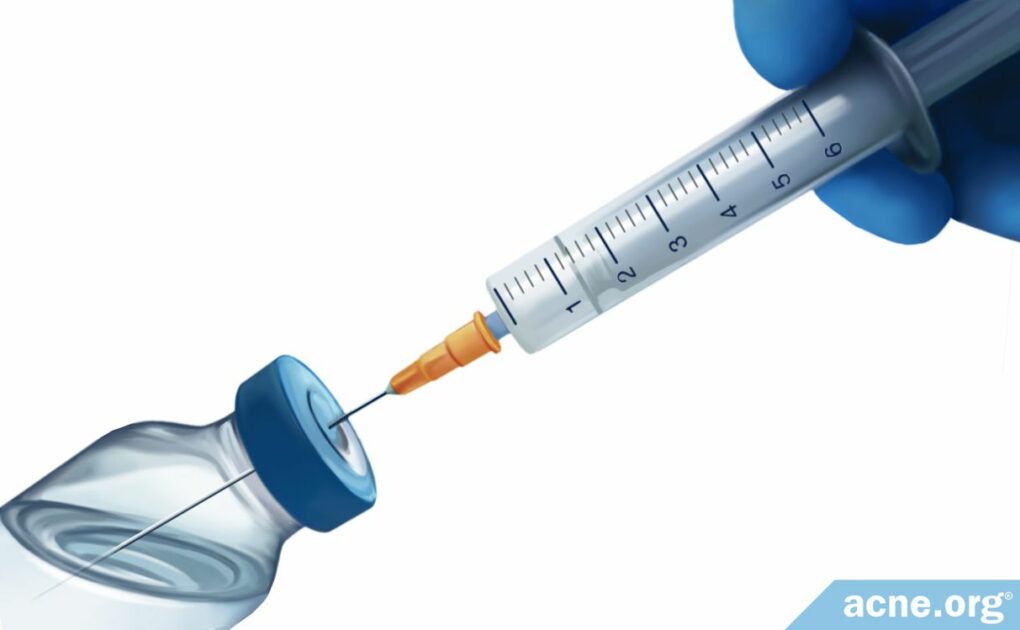These Doctor-Administered Injections Quickly and Dramatically Reduce Inflammation, Speed Healing, and Reduce Scarring in Severe Acne Lesions

The Essential Info
Cortisone shots are one of those modern medical miracles that have been around for a while so they don’t get the credit they deserve. If you get a severe acne lesion–the kind that are big (over 5mm in diameter) and don’t come to a head–a cortisone shot can quickly kickstart the healing process.
What It Is: A cortisone shot is a steroid injection that a dermatologist or any other doctor can administer. The injection goes right into the lesion, where it will almost immediately reduce inflammation and swelling, thus beginning the healing process and reducing the chance of scarring. While they are not recommended for frequent use, do not hesitate to visit your doctor for a cortisone shot if you need one.
Side Effects: Side effects can include a temporary sunken spot or lightening of the skin where the shot was administered.

The Science
- What Types of Lesions Do Cortisone Shots Treat?
- What Is Cortisone?
- What Does It Do?
- Studies on Cortisone and Acne
- What Are the Side Effects?
- How Do I Prevent Nodules and Cysts in the First Place?
What Types of Lesions Do Cortisone Shots Treat?
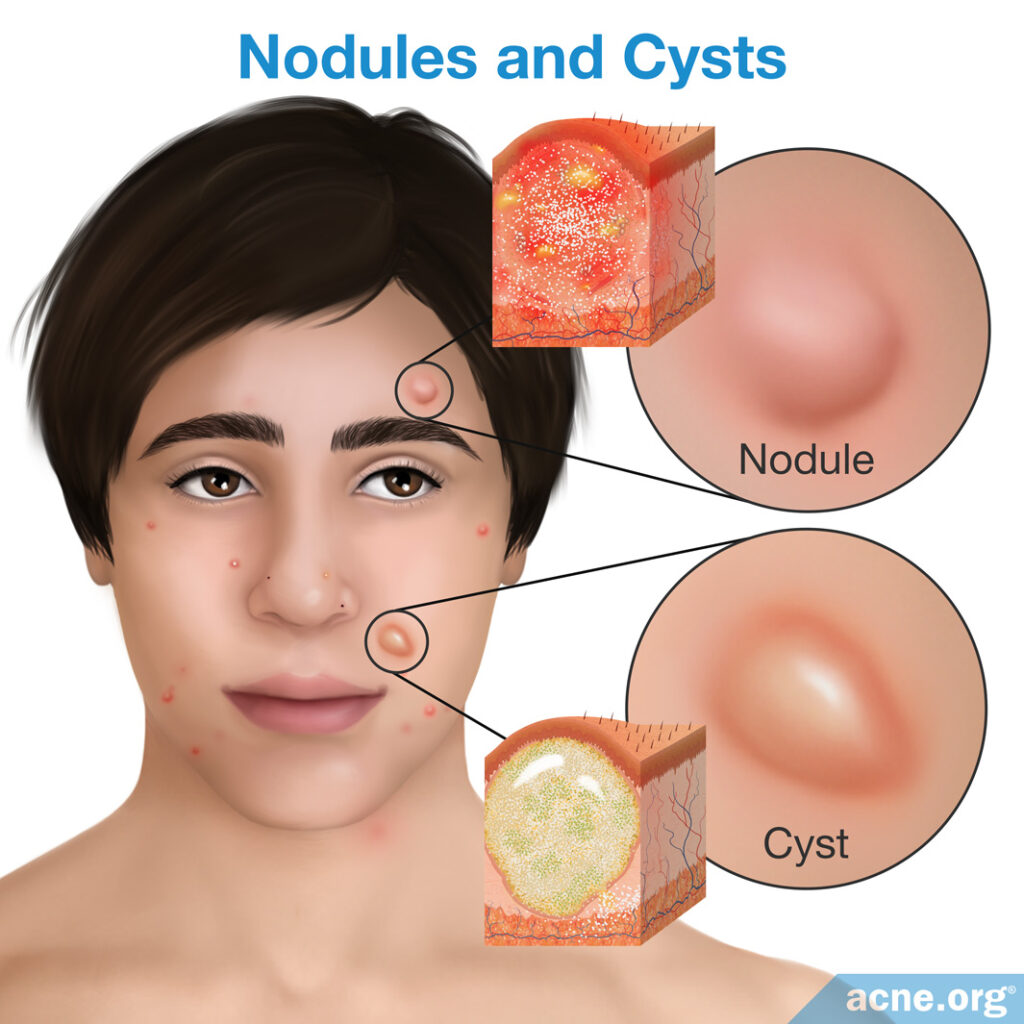
Nodules and cysts are large acne lesions (5mm or more in diameter) and are both commonly referred to as “cystic acne.” These lesions are deep within the skin and do not come to a head. They are often stubborn and resistant to topical treatment. Nodules and cysts can last for weeks or even months if left untreated, and can scar.
Cortisone shots need not be reserved for special occasions. Feel free to make an appointment with your dermatologist or doctor for injections on an as-needed basis.
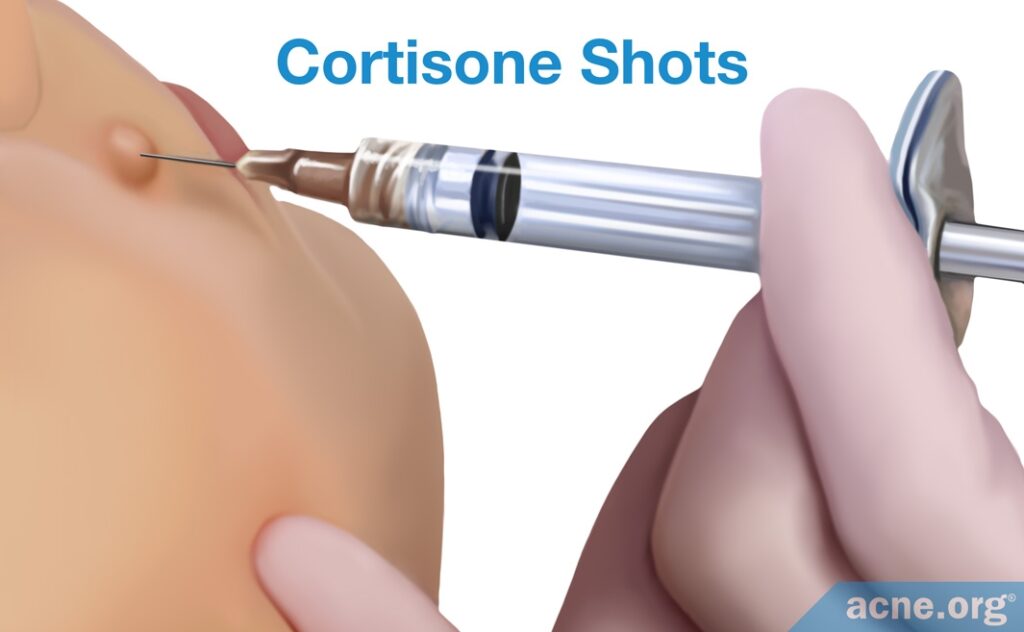
What Is Cortisone?
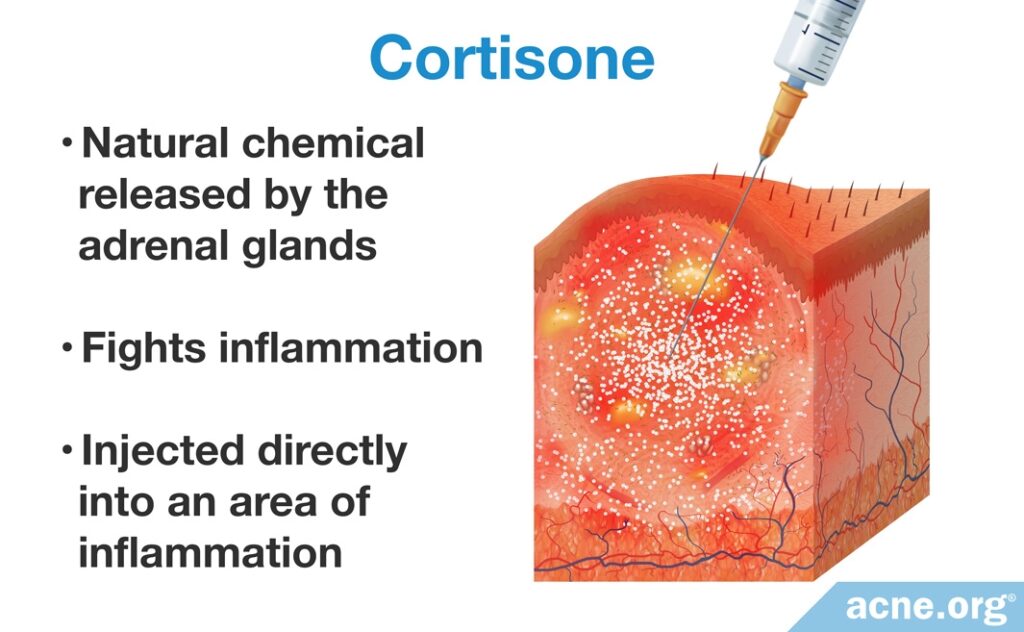
Cortisone is a natural chemical that exists in our bodies, which is released by the adrenal glands in response to stress. One of its functions is to fight inflammation.1 Synthetic cortisone is sometimes injected directly into an area of inflammation, where it can reduce inflammation quickly.
What Does It Do?
Cortisone can quickly and dramatically reduce inflammation and speed up healing. With cystic acne lesions, healing usually begins immediately after a cortisone injection. Importantly, arresting a severe lesion’s development and beginning the healing process can also prevent scarring.
Studies on Cortisone and Acne
Despite doctors regularly administering cortisone shots directly into acne lesions, studies on acne patients have only been performed on systemic (in the blood) cortisone, and never on cortisone shots themselves.
Expand to read details of studies
Two older studies performed in 1954 seem to show that cortisone in the blood may sometimes help with acne. The first very small study showed that intravenous (directly in the vein) cortisone reduced acne in all six patients who were enrolled.2 The other study reported that systemic (in the blood) cortisone reduced acne in only 5 of 17 patients studied, although they did not report how cortisone was administered.3 Both of these studies used a very small sample size, so the results should be interpreted with caution.
Despite this lack of published evidence that supports the use of cortisone shots to treat acne, in the real world, dermatologists routinely use cortisone shots with consistently good results.
What Are the Side Effects?
A cortisone shot can be somewhat painful, but your doctor can use a topical anesthetic to numb the area before the shot if desired.
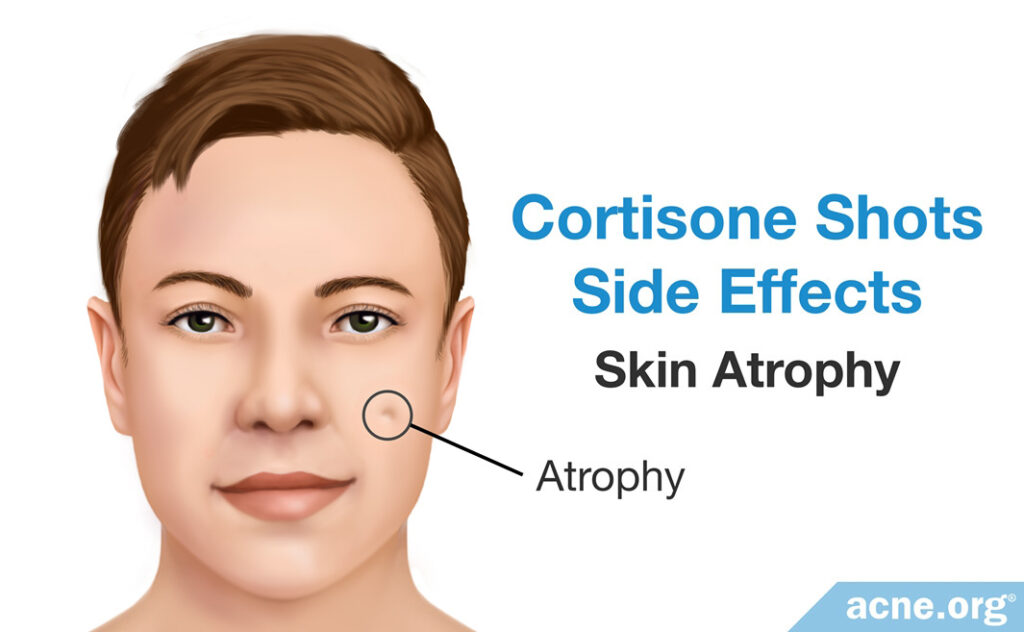
Skin atrophy: Most notably, a cortisone injection can produce atrophy of the fatty tissue surrounding the injection. The injection area can end up looking sunken or depressed. This atrophy is temporary, but can take several months to return to normal. A small amount of research evidence suggests that topical tretinoin or another topical retinoid might counteract the atrophy and skin thinning caused by cortisone shots. Therefore, if you are concerned about skin atrophy, ask your doctor for a prescription for a topical retinoid, which could help prevent atrophy from occurring.6,7
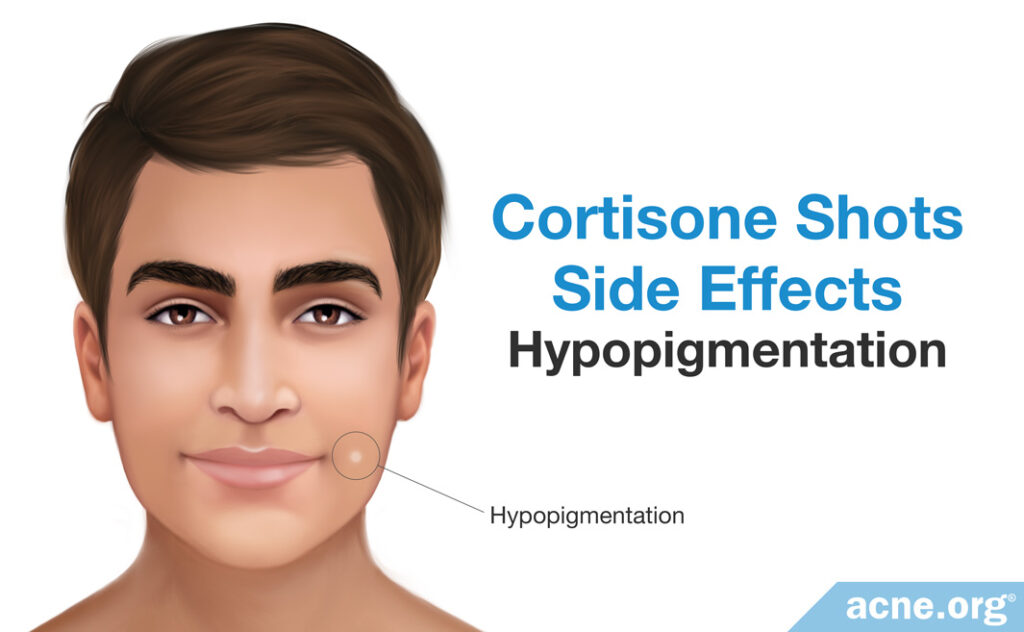
Skin lightening: Since cortisone is naturally produced in the body, other side effects are rare, but may include hypopigmentation (white spot) at the site of injection in darker-skinned individuals.
Thinning of the skin (repeated use): Repeated use of cortisone shots can impair the skin’s ability to repair itself, and can cause thinning of the skin.4-5
How Do I Prevent Nodules and Cysts in the First Place?
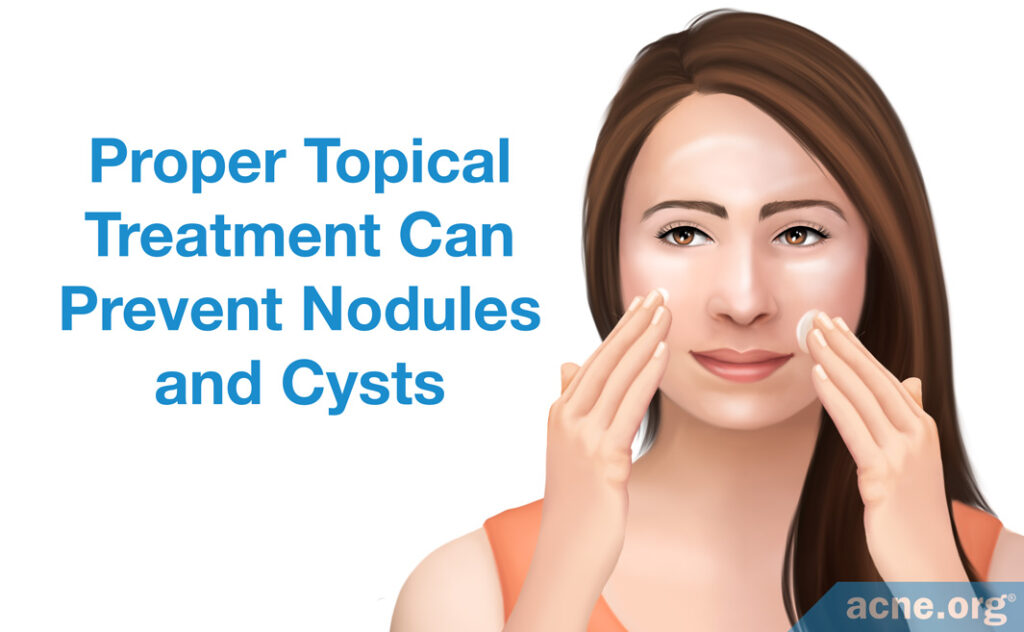
Cortisone shots can’t be used as preventative treatment, so other preventative measures must be taken.
Proper topical treatment can prevent nodules and cysts from forming in the first place. If you have an extreme case of acne that is deeply scarring and widespread, you may wish to learn more about Accutane (isotretinoin).
References
- Cole, B. J. & Schumacher, H. R., Jr. Injectable corticosteroids in modern practice. J. Am. Acad. Orthop. Surg. 13, 37 – 46 (2005). https://www.ncbi.nlm.nih.gov/pubmed/15712981
- Farber, E. M. & Claiborne, E. R. Acne conglobata; use of cortisone and corticotropin in therapy. Calif. Med. 81, 76 – 78 (1954). https://www.ncbi.nlm.nih.gov/pubmed/13182626
- Didcoct, J. W. Observations on the effect of cortisone in acne vulgaris. J. Invest. Dermatol. 22, 243 – 247 (1954). https://core.ac.uk/download/pdf/81974467.pdf
- Levy, L. L. & Zeichner, J. A. Management of acne scarring, part II: a comparative review of non-laser-based, minimally invasive approaches. Am. J. Clin. Dermatol. 13, 331 – 340 (2012). https://www.ncbi.nlm.nih.gov/pubmed/22849351
- Fisher, D. A. Adverse effects of topical corticosteroid use. West J. Med. 162, 123 – 126 (1995). https://www.ncbi.nlm.nih.gov/pmc/articles/PMC1022645/
- McMichael, A. J., Griffiths, C. E., Talwar, H. S., Finkel, L. J., Rafal, E. S., Hamilton, T. A. & Voorhees, J. J. Concurrent application of tretinoin (retinoic acid) partially protects against corticosteroid-induced epidermal atrophy. Br. J. Dermatol. 135, 60-64 (1996). https://www.ncbi.nlm.nih.gov/pubmed/8776360
- Barnes, L., Kaya, G. & Rollason, V. Topical corticosteroid-induced skin atrophy: a comprehensive review. Drug Saf. 38, 493-509 (2015). https://pubmed.ncbi.nlm.nih.gov/25862024/
 Acne.org Products
Acne.org Products